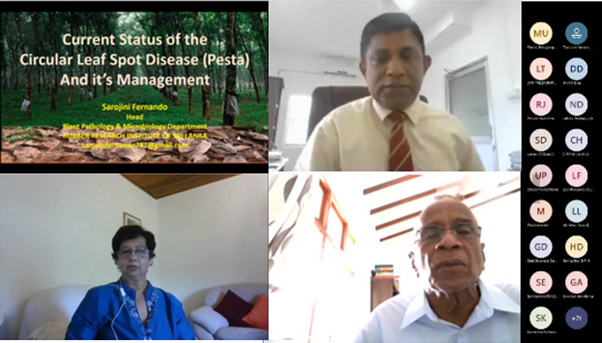July, 18, 2022

With the rubber industry coming under increasing threat due to the rapid progression of the Circular Spot Leaf disease affecting rubber plantations across the country, the Colombo Rubber Traders Association recently conducted a webinar to discuss with and educate stakeholders on managing the disease.
The webinar was the third in a series of webinar organized to address the rapid spread of the disease. Having first emerged in 2019, affecting 10,000 Ha of rubber plantations, the extent of the disease has since increased significantly, affecting 20,000 Ha in 2020 and doubling to a total of 40,000 Ha being affected in 2021.
The webinar was presented by Dr. Sarojini Fernando, Head – Plant Pathology and Microbiology Department of the Rubber Research Institute of Sri Lanka (RRISL), who briefed participants on the latest reports and the ground level situation regarding the disease. Session panelists comprised Dr. Mrs. Priyani Senevirathne, Deputy Director Research (Biology) – RRISL, Dr. L.M.K Thilakarathne – a former Director of RRISL and Mr. Udara Premathilake, Director Plantations (Rubber) – Kelani Valley Plantations PLC. The webinar was moderated by Mr. Manoj Udugampola, Chairman – Colombo Rubber Traders’ Association and Chief Operation Officer - Rubber, Pussellawa Plantations Ltd. Over 100 participants representing all industry stakeholder groups attended the webinar.
Due to the grave consequences, the continued spread of the disease could pose to the Natural Rubber industry in the country, the Ministry of Plantation Industries has established a task force to address the situation with urgency. Officials of the Ministry of Plantations, RRISL and the Rubber Development Department stated that their organizations are collaborating with Rubber smallholders and corporate sector plantation companies to manage the disease and minimize economic losses. It was also noted that while Cabinet approval has been granted to import the required chemicals, which were under the ‘restricted imports’ category, the appreciation of the US Dollar against the rupee has rendered the prices of these chemicals prohibitively expensive.
Video Story